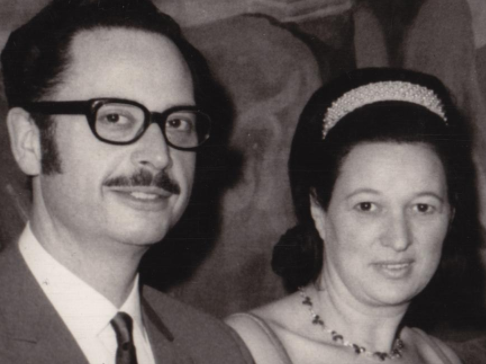Harry Pinsker: Accountant who took charge of The Beatles’ finances
Harry Pinsker handled the Fab Four’s money during their early career and ensured the taxman didn’t get his hands on everything

Very few accountants can ever truly lay claim to being the inspiration behind the creation of a popular hit song. One who undoubtedly could was Harry Pinsker, who has died aged 90. Until falling foul of John Lennon in 1968, it was this little-known member of The Beatles’ intimate inner circle who, throughout the roller coaster years of the 1960s, took charge of the Fab Four’s finances, set up their companies, signed off their expense claims and even helped purchase their numerous homes.
Chaotic early business deals had meant that when the group were first topping the record charts, they were getting just one-fifth of a penny each for every record sold. Having successfully clawed their way up from the poverty of working-class Liverpool, they then found a confiscatory Labour government intent on trying to halt their rise. When Pinsker laid bare the huge scale of their tax liabilities, it led George Harrison to pen perhaps one of the finest of his many classic tracks, “Taxman”.
Berating Harold Wilson’s proposed 95 per cent super tax, this autobiographical song’s opening lyric, “Let me tell you how it will be / There’s one for you, 19 for me,” was no mere poetic licence. With Harrison revelling in his role as the first singing economist, he powerfully satirises the mindset of those committed to wealth redistribution: “Should five per cent appear too small / Be thankful I don’t take it all.” Its message is still used today to illustrate the impact of high marginal tax rates.
Pinsker himself was the youngest son of a printer, born in Bethnal Green, east London; his mother a Russian born emigre. While he had early ambitions to enter medicine or the law, these suffered badly in the chaos of wartime Britain. Evacuated first to Norfolk and then to Cornwall, having been rejected by Truro College because of his Jewish faith, instead he enrolled at St Marylebone Grammar School, then based in Redruth. However, a serious bout of peritonitis forced a rethink of his career options.
In 1947, Pinsker joined the London offices of accountants Bryce Hanmer as an articled clerk. Based in Albemarle Street, the firm boasted a varied portfolio of clients, among them numerous show business stars that included Arthur Askey, Flanagan and Allen, Jimmy Edwards and impresario, Jack Hylton. At their Liverpool branch, they looked after furniture store owner, Harry Epstein. When his son Brian sought to diversify into the pop music industry, he was referred to the London offices and Harry Pinsker.
Pinsker first met The Beatles and their manager in 1962. On a personal level, he got on well with Epstein, though he was less than enamoured with his supposed business acumen. Early agreements had ended up costing the band a fortune as they missed out not only on lucrative American merchandising deals but also a proposed $3m sponsorship agreement with Coca-Cola. As for The Beatles themselves, while finding them polite, he thought them scruffy.
Very few accountants can ever truly lay claim to being the inspiration behind the creation of a popular hit song
They however were very impressed with him, particularly when he managed to adroitly sidestep the usual six-month waiting list for telephones to be installed in their newly acquired flats. Having won their trust, he then proceeded to set-up a songwriting company which he titled Lenmac. However, while Pinsker deemed it a trading company, the taxman disagreed, viewing it as unearned income and thus subject to a higher rate of tax. The Inspector of Taxes eventually agreed with Pinsker.
With the press constantly describing them as millionaires, Pinsker urged caution, forever reminding the group that their millions were earnings, not assets. When facing a tax bill of £3m, Pinsker suggested that it would be advantageous to purchase a freehold property, 3 Savile Row, and make a move into retail trading by selling furniture. The result was Apple, which spawned a host of satellite companies that included a hippy clothing boutique. Pinsker himself sat on the Apple board.
When Apple released the Two Virgins album with a naked photograph of both John Lennon and Yoko Ono on the cover in November 1968, Pinsker and four other directors resigned after fearing that the company would be sued for indecency, especially as Lennon was refusing to withdraw the record.
Having gobbled up losses of more than a million pounds, when the American financier, Allan Klein, took over the group’s management, following talks with Pinsker, much of the operation was closed down.
The Beatles were not the only artistes in the Brian Epstein stable that Pinsker helped look after. He also audited the accounts of Billy J Kramer and the Dakotas, Gerry and the Pacemakers and Cilla Black. He later went on to look after the affairs of Yes, Cream and Eric Clapton. Throughout the course of almost half a century with Bryce Hanmer, despite enticing offers to spill the beans on the group, he rarely, if ever, gave interviews. He remained as always, the very epitome of discretion.
As for The Beatles, when they were being filmed rehearsing at Abbey Road Studios in 1969 for their final album, Let it Be, having begun chanting, “Hare Krishna”, after a minute or so they honoured their esteemed accountant by subtly changing the words to “Harry Pinsker”. This rather shy family man was further humbled when Paul McCartney, questioned for a biography of the group, would generously let slip that in his view Pinsker was the only one who really knew what went on.
Pinsker married his wife, Ana Simca, in 1955 and they were together until her death in 2008. He is survived by his three daughters.
Harry Pinsker, accountant, born 12 May 1930, died 24 January 2021
